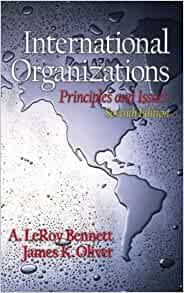
James K. Oliver
The authors of this book have been observers, students, and teachers of international organizations for more than fifty years. During that period of time the United Nations, as the primary general-purpose intergovernmental organization, has fluctuated between success and failure and has met with both public support and skepticism. The authors are normatively committed to the indispensability of global and regional international and transnational organizations in an age when people and nation-states must adapt to a shrinking and increasingly interdependent globe and the growing demand for global governance.
In this study the authors follow no single model and are eclectic in their interests. The focus is on the philosophy and principles of international organizations and on a broad range of issues with which these organizations try to deal. A balance is struck between comprehensive coverage of the problems, inquiries, and decisions that face these organizations daily and the limitations that must be observed in tailoring a textbook for a one-semester course. The use of several tables, charts, and case studies provides devices for summarizing and illustrating detailed activities. Yet comprehensiveness has not been sacrificed by omitting discussion on any major activity of international organizations. Neither has it been assumed that the student possesses prior detailed knowledge of the subject.
ავტორის წიგნები
-
International Organizations: Principles and Issues | James K. Oliver
This comprehensive historical, institutional and functional/programmatic analysis of the development of contemporary international organizations in all forms, examines the activities of salient regional organizations and non-governmental organizations, as well as multinational corporations. Focusing on major principles, organizational characteristics, functions, and activities of the United Nations and UN system, the book strikes a balance between comprehensive coverage of the problems, inquiries, and decisions that face these organizations, with concise, accessible coverage of the subject. The volume addresses the league of nations, the genesis of the United Nations, basic principles, organization, structure and operations of the UN, peaceful settlement of disputes, collective security and peacekeeping, the search for justice under law, controlling the instruments of war, varieties of regionalism, globalization, transnational relations and international organization, promoting economic welfare, managing global resources, promoting social progress, human rights, international administration and international organization in retrospect and prospect, For individuals interested in international affairs and organizations.
15.00 ₾

